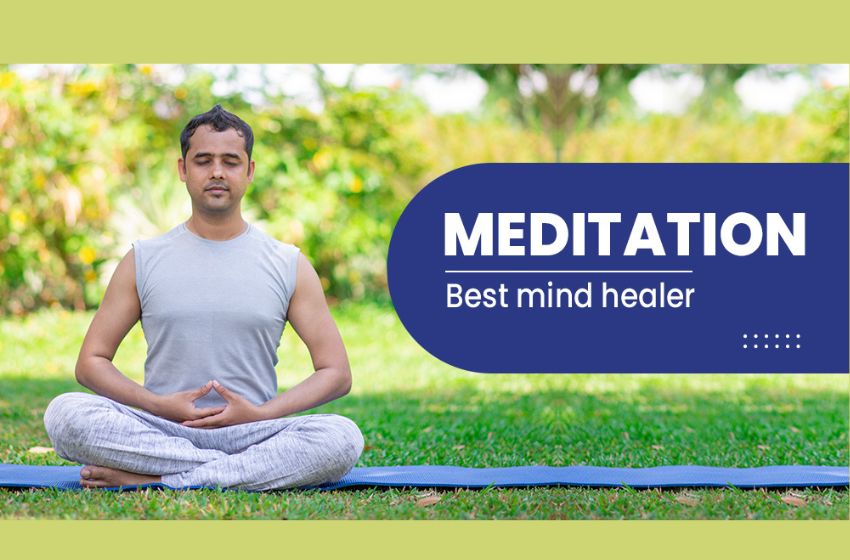From Stress to Serenity | Discover the Transformative Powers of Meditation
7 min read

Introduction to Meditation
Meditation is a powerful practice that has been around for thousands of years and has been used by various cultures and religions as a means of achieving inner peace, clarity, and spiritual growth. It involves training the mind to focus on the present moment, bringing awareness to one's thoughts, feelings, and surroundings.
The art of meditation may seem intimidating at first, with images of monks sitting in silence for hours coming to mind. However, meditation can be practiced by anyone regardless of age, gender or beliefs. It is a simple yet profound technique that can bring about numerous benefits in our daily lives.
Benefits of Meditation
Meditation not only helps us find inner peace but also provides numerous mental, emotional and physical benefits. Regular practice can help reduce stress and anxiety levels, improve focus and concentration, increase self-awareness and self-acceptance, promote emotional well-being and overall happiness.
In today's fast-paced world where stress seems to be an inevitable part of life, the transformative powers of meditation have gained more attention than ever before. More people are turning towards meditation as a tool for managing their mental health and finding balance amidst the chaos.
Understanding Stress: Causes and Effects on the Mind and Body
Stress is an inevitable part of life. We all experience it in different ways and to varying degrees. It can come from external sources such as work, relationships, or financial pressure, or from internal factors like personal expectations and self-criticism. While a certain amount of stress can be motivating and beneficial for our performance and growth, chronic stress can have detrimental effects on both our mind and body.
Understanding the causes of stress is crucial in managing it effectively. One major cause of stress is our perception of events or situations. When we perceive something as threatening or overwhelming, our body responds by releasing hormones like cortisol and adrenaline that trigger the "fight or flight" response. This response was originally designed to help us deal with immediate physical threats, but in modern times it can be triggered by psychological stressors as well.
Another common cause of stress is our busy lifestyles. The constant pressure to do more, achieve more, and be constantly connected has become the norm in today's society. This leads to a never-ending cycle of busyness that leaves us feeling frazzled and exhausted.
The effects of stress on the mind are significant. It can lead to feelings of anxiety, irritability, difficulty concentrating, and even depression. Chronic stress also takes a toll on our mental health over time, increasing the risk for conditions like burnout and anxiety disorders.
How Meditation Can Help Combat Stress
Meditation has been practiced for thousands of years and is known to have numerous benefits for the mind, body, and soul. One of the most significant advantages of meditation is its ability to combat stress. In today's fast-paced world, where stress seems to be an ever-present factor in our lives, learning how to manage it is crucial for our overall well-being.
So how exactly can meditation help us combat stress? Let's dive into some specific ways that this ancient practice can transform our minds and bodies and bring us to a state of serenity.
1. Promotes Relaxation - One of the primary causes of stress is a constant state of tension in our bodies and minds. We are always rushing from one task to another, constantly bombarded with information and stimuli, which leaves us feeling overwhelmed and anxious. Meditation offers a much-needed break from this never-ending cycle by inducing a deep state of relaxation. By focusing on your breath or a mantra during meditation, you allow your mind and body to let go of tension and enter into a calm state. This relaxation response helps reduce cortisol levels (also known as the stress hormone) in the body and promotes feelings of peace.
The Benefits of Regular Meditation Practice
Meditation has been practiced for thousands of years and is deeply rooted in various spiritual and cultural traditions. However, in recent times, it has gained widespread popularity as a tool for managing stress and promoting overall well-being. Regular meditation practice has numerous benefits that can positively impact our mental, emotional, and physical health.
1. Reduces Stress and Anxiety: One of the most significant benefits of regular meditation practice is its ability to reduce stress levels. By focusing on the present moment and quieting the mind, meditation helps to calm the nervous system and release tension from the body. Studies have shown that regular meditation can significantly decrease symptoms of anxiety, such as racing thoughts, restlessness, and irritability.
2. Increases Self-Awareness: Meditation involves turning inward and paying attention to one's thoughts, emotions, and sensations without judgment. This process allows us to become more aware of our patterns of thinking and reacting to different situations. With increased self-awareness comes an understanding of our thought patterns that may be causing stress or negative emotions. As a result, we can learn to respond rather than react to challenging situations.
Different Types of Meditation Techniques
Meditation is a practice that has been used for centuries to promote relaxation, reduce stress and improve overall well-being. It involves training the mind to achieve a state of inner peace and clarity through various techniques. While there are many different types of meditation practiced around the world, they can all be classified into two main categories: focused attention meditation and open monitoring meditation.
1. Focused Attention Meditation:This type of meditation involves concentrating on a specific object or sensation such as the breath, a mantra or an image. The goal is to focus your attention on one thing and let go of any distracting thoughts. This helps to calm the mind and improve concentration.
a) Breath Awareness Meditation:Breath awareness meditation is one of the most popular forms of focused attention meditation. It involves observing the natural rhythm of your breathing without trying to control it. This technique allows you to focus your mind on the present moment, promoting relaxation and reducing stress.
b) Mantra Meditation:Mantra meditation involves repeating a word or phrase (mantra) either silently or aloud during the practice. The repetition helps to quieten the mind and bring about a sense of calmness and inner peace.
2. Open Monitoring Meditation:In this type of meditation, instead of focusing on one specific object, you become aware of all aspects of your current experience including thoughts, emotions, physical sensations, and external stimuli without reacting or judging them.

Tips for Getting Started with Meditation
Meditation is a powerful tool for reducing stress and promoting overall well-being. However, it can be intimidating for beginners who are unsure of where to start. If you're new to meditation, here are some helpful tips to get you started on your journey towards inner peace and serenity:
1. Find a quiet and comfortable space: The first step in starting your meditation practice is to find a quiet and comfortable space where you won't be disturbed. This could be a corner of your room, a peaceful spot in nature, or even just a quiet room in your house. Make sure that the environment is free from distractions such as noise, bright lights or strong smells.
2. Set aside dedicated time: It's essential to set aside dedicated time for your meditation practice each day. Start with just 5-10 minutes and gradually increase the duration as you become more comfortable with the practice.
3. Get into a comfortable position: There's no right or wrong way to sit during meditation - what matters most is that you're comfortable and can maintain an upright posture. You can sit cross-legged on the floor, on a cushion, or in a chair with your feet flat on the ground.
Conclusion: Embracing Serenity through Meditation
Meditation is a powerful tool that has been used for centuries to achieve inner peace and clarity. From ancient Eastern practices to modern Western techniques, the benefits of meditation have been recognized by many cultures and individuals around the world. In this article, we have explored how meditation can help us transform stress into serenity.
The journey from stress to serenity begins with understanding the root causes of our stress. Often, it is our thoughts and emotions that create tension and anxiety in our minds. Through regular meditation practice, we develop the ability to observe these thoughts without judgement and let them go, leading to a sense of calmness and tranquility.
Moreover, meditation also helps us cultivate mindfulness – the state of being fully present in the moment. By focusing on our breath or a mantra during meditation, we train our minds to stay anchored in the present instead of dwelling on past regrets or future worries. This allows us to fully experience each moment as it unfolds, without getting caught up in stressful thoughts.
As we continue with our meditation practice, we also become more aware of our body sensations and emotions. We learn to recognize physical tension in specific areas of our body and release it through deep breathing and relaxation techniques. We also become more attuned to our emotional states and are better equipped to handle them without reacting impulsively.






